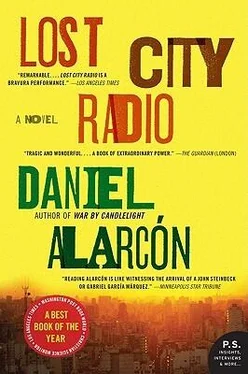“Are you waiting for someone?” she asked.
“No. Why?”
“Because you keep looking over my shoulder.”
“Am I?”
She saw him gulp.
“I’m sorry,” Rey said.
She laughed nervously. It was March, a week before her birthday, and maybe she felt entitled to his time. Later, she would wonder, but now she dragged him by the arm to a bench, away from the crowd, from the musicians. There she unceremoniously tipped her bag over, spilling its contents: pens that had run out of ink, scraps of paper, a tiny address book, some tissues, a neglected tube of lipstick she’d used only once — she wasn’t that kind of girl — a pair of sunglasses, some coins. “It’s in here somewhere, I know it is. You remember me now, don’t you?”
She rummaged through the detritus, and he admitted he did.
“Why did you say you didn’t?”
But when he began to answer, Norma cut him off. “Oh, here it is,” she said. She held it up to his face, squinting against the hard light. She had meant it playfully, but she saw now, as color rushed to his cheeks, how embarrassed he was. There were new lines on his face and dark bags under his eyes. His skin had yellowed, and she could see the sharp outline of his cheekbones. Rey must have lost fifteen pounds.
“I’m not what you expected?” Of course, he knew better than anyone how this last year had aged him.
She pretended not to understand. “What do you mean?”
“Nothing.”
She handed him the identification card, and he held it for a moment. He rubbed the picture with his thumb. “Thank you,” he said, and started to get up.
“Wait. I’m Norma.” She held her hand out. “I wondered what happened to you.”
Rey smiled weakly and shook her outstretched hand. He nodded at the ID. “I guess you know who I am.”
“Well…”
“Right.”
“Where did they take you?”
“Nowhere really,” he said and, when she frowned, he added, “You don’t believe me?”
Norma shook her head. “Sit down. Please. You’re running away.” He sat, and it made her smile. “Should I call you Rey?”
“Why do you want to know?”
“Because I like you,” Norma said, and he didn’t answer. But he didn’t leave either. The student musicians were playing now, native music with native instruments, appropriately political lyrics. Nothing had yet changed at the university: banners still hung from the lampposts, walls were still adorned with ominous slogans. The war had begun only weeks before, in a faraway corner of the nation, and many of the students still thought of it with excitement, as if it were a party they would soon be invited to attend.
“You should have thrown it away, you know,” Rey said. “Or burned it.”
“I didn’t know. I thought maybe you might need it. I’m sorry.”
They were quiet for a spell, watching the students, listening to the band. “I was afraid something was going to happen to you,” said Rey.
“I have better luck than that.”
“Are you sure?”
“I’m alive, aren’t I?” She turned to him. “And you are too. So you must not be as unlucky as you think.”
He gave her a weak smile and seemed to hesitate. Then he took off his wool hat. It was too hot for something like that anyway. He had gone white at the temples, shocking streaks of it on otherwise black hair. Or had she not noticed it that night, one year before? How could she not have?
He scratched his head. “Very lucky, I know,” he murmured. “It’s what everyone says.”
THINGS WERE unquestionably bad. The curfew had been tightened, the IL raids on police stations had increased; at the edge of the city, control of the Central Highway was fought over each night after dark. These were days of fear on all sides. For sympathizers, when it was over, it would seem that victory had been tantalizingly close, but this was a misreading of the situation. The IL was desperate for a decisive military victory; recruitment was down, and many thousands had been killed. The apparatus of the state had proved, after a decade of war, to be more resilient than anyone had expected. In this, the final year of the war, the IL had all but lost control of its far-flung fighters. Actions in the provinces were highly decentralized, tactically dubious, and often brazen to the point of being ill-conceived. Heavy losses were inflicted on increasingly isolated bands of fighters. Some platoons responded by retreating deeper into the jungle, no longer warriors and true believers but seminomadic tribes of armed and desperate boys. When the war ended suddenly, they refused to put down their weapons. They continued fighting, because they could think of nothing else to do.
Meanwhile, the IL leadership focused on what it could control directly: the urban war, the central front of which was the embattled district of Tamoé, at the northeastern edge of the city, a slum of one million bordering the Central Highway. The idea was to use Tamoé as staging ground from which to choke off the city: attack food convoys from the fertile Central Valley, starve the city, spark food riots, and then glory in the chaos. They very nearly succeeded. For the six months before the government offensive on Tamoé, the bluffs overlooking the Central Highway were the backdrop for great and violent confrontations. The insurgents laid bombs along the roadside and disappeared into the overcrowded neighborhoods of Tamoé. Truck drivers were kidnapped, their cargo set ablaze. Police checkpoints were attacked with stolen grenades. The army responded by increasing patrols in the area, and were greeted by snipers hidden in the hills or on rooftops.
In May of that year, a girl of five was killed in Tamoé, by a bullet of indeterminate origin. There were soldiers in the area, searching for a sniper. An angry mob gathered around the soldiers. More shots were fired, and the crowd grew. A soldier was killed. The Battle of Tamoé had begun. When this uprising was quelled, the war would be over.
But all of this happened after Rey left the city for the last time. If it weren’t for the boy, his son, Rey might not have returned to the jungle at all. His contact had disappeared, left him without any further direction, and it amounted to a welcome vacation. But he went anyway, because he couldn’t get the boy out of his mind. When he heard of the battle, he was in the jungle, far enough away to suppose he was safe. He spent an evening with the rest of the village, listening to the radio for news, and was surprised to find that the IL’s defeat did not surprise him. It was an all-or-nothing proposition, and it always had been: so now there was nothing. The tanks that ran through the narrow streets, the blocks and blocks burned to the ground, the fighting that raged for four days house to house — in their hearts, hadn’t everyone known this was coming? In the aftermath of the battle, while the government proclaimed victory and the rest of the city celebrated, the dry, dusty lots of the district became home to thousands of displaced families, all with sons and fathers missing: a city of women and children. The army kept them corralled together for weeks in a makeshift tent city while the government decided what to do with them. Rey would have recognized many of them, from his work there so many years before.
These are facts: had he postponed his trip by a month, he might have survived the war. If he hadn’t returned to see his son, a hundred young men and the handful of women camped a day’s travel from 1797 might have lived as well.
Rey arrived in the village only six weeks after Blas had left. 1797 was still abuzz with excitement, and now there were dozens of portraits that no one knew quite what to do with. Many were hidden away, others were displayed prominently in people’s homes. He found it strange, as if the village had doubled in size while he was gone. Everyone he spoke to had had a portrait drawn of someone, and all seemed eager to talk about it. The village had collectively decided to address the fact of its own disappearance. He was at the canteen one afternoon when an older woman stormed in, walked directly toward him. Rey was sitting with Adela and their boy. The woman didn’t waste time: after apologizing for interrupting their meal, she unrolled her drawings all at once and begged Rey to look at them. They were of her husband and her son, whom she hadn’t seen in five years. She spoke so loudly that the baby looked up and began to cry.
Читать дальше












